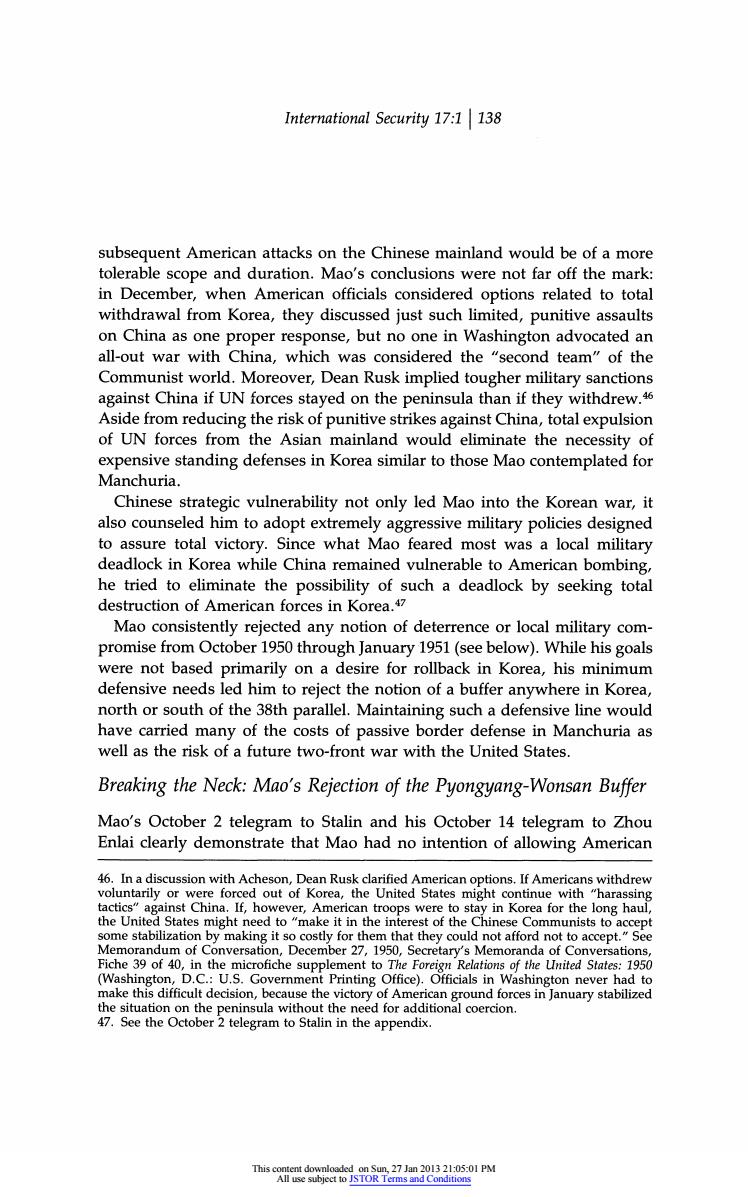正在加载图片...

International Security 17:1 138 subsequent American attacks on the Chinese mainland would be of a more tolerable scope and duration.Mao's conclusions were not far off the mark: in December,when American officials considered options related to total withdrawal from Korea,they discussed just such limited,punitive assaults on China as one proper response,but no one in Washington advocated an all-out war with China,which was considered the "second team"of the Communist world.Moreover,Dean Rusk implied tougher military sanctions against China if UN forces stayed on the peninsula than if they withdrew.46 Aside from reducing the risk of punitive strikes against China,total expulsion of UN forces from the Asian mainland would eliminate the necessity of expensive standing defenses in Korea similar to those Mao contemplated for Manchuria. Chinese strategic vulnerability not only led Mao into the Korean war,it also counseled him to adopt extremely aggressive military policies designed to assure total victory.Since what Mao feared most was a local military deadlock in Korea while China remained vulnerable to American bombing, he tried to eliminate the possibility of such a deadlock by seeking total destruction of American forces in Korea.47 Mao consistently rejected any notion of deterrence or local military com- promise from October 1950 through January 1951(see below).While his goals were not based primarily on a desire for rollback in Korea,his minimum defensive needs led him to reject the notion of a buffer anywhere in Korea, north or south of the 38th parallel.Maintaining such a defensive line would have carried many of the costs of passive border defense in Manchuria as well as the risk of a future two-front war with the United States. Breaking the Neck:Mao's Rejection of the Pyongyang-Wonsan Buffer Mao's October 2 telegram to Stalin and his October 14 telegram to Zhou Enlai clearly demonstrate that Mao had no intention of allowing American 46.In a discussion with Acheson,Dean Rusk clarified American options.If Americans withdrew voluntarily or were forced out of Korea,the United States might continue with "harassing tactics"against China.If,however,American troops were to stay in Korea for the long haul, the United States might need to "make it in the interest of the Chinese Communists to accept some stabilization by making it so costly for them that they could not afford not to accept."See Memorandum of Conversation,December 27,1950,Secretary's Memoranda of Conversations, Fiche 39 of 40,in the microfiche supplement to The Foreign Relations of the United States:1950 (Washington,D.C.:U.S.Government Printing Office).Officials in Washington never had to make this difficult decision,because the victory of American ground forces in January stabilized the situation on the peninsula without the need for additional coercion. 47.See the October 2 telegram to Stalin in the appendix. This content downloaded on Sun,27 Jan 2013 21:05:01 PM All use subject to JSTOR Terms and ConditionsInternational Security 17:1 1 138 subsequent American attacks on the Chinese mainland would be of a more tolerable scope and duration. Mao's conclusions were not far off the mark: in December, when American officials considered options related to total withdrawal from Korea, they discussed just such limited, punitive assaults on China as one proper response, but no one in Washington advocated an all-out war with China, which was considered the "second team" of the Communist world. Moreover, Dean Rusk implied tougher military sanctions against China if UN forces stayed on the peninsula than if they withdrew.46 Aside from reducing the risk of punitive strikes against China, total expulsion of UN forces from the Asian mainland would eliminate the necessity of expensive standing defenses in Korea similar to those Mao contemplated for Manchuria. Chinese strategic vulnerability not only led Mao into the Korean war, it also counseled him to adopt extremely aggressive military policies designed to assure total victory. Since what Mao feared most was a local military deadlock in Korea while China remained vulnerable to American bombing, he tried to eliminate the possibility of such a deadlock by seeking total destruction of American forces in Korea.47 Mao consistently rejected any notion of deterrence or local military compromise from October 1950 through January 1951 (see below). While his goals were not based primarily on a desire for rollback in Korea, his minimum defensive needs led him to reject the notion of a buffer anywhere in Korea, north or south of the 38th parallel. Maintaining such a defensive line would have carried many of the costs of passive border defense in Manchuria as well as the risk of a future two-front war with the United States. Breaking the Neck: Mao's Rejection of the Pyongyang-Wonsan Buffer Mao's October 2 telegram to Stalin and his October 14 telegram to Zhou Enlai clearly demonstrate that Mao had no intention of allowing American 46. In a discussion with Acheson, Dean Rusk clarified American options. If Americans withdrew voluntarily or were forced out of Korea, the United States might continue with "harassing tactics" against China. If, however, American troops were to stay in Korea for the long haul, the United States might need to "make it in the interest of the Chinese Communists to accept some stabilization by making it so costly for them that they could not afford not to accept." See Memorandum of Conversation, December 27, 1950, Secretary's Memoranda of Conversations, Fiche 39 of 40, in the microfiche supplement to The Foreign Relations of the United States: 1950 (Washington, D.C.: U.S. Government Printing Office). Officials in Washington never had to make this difficult decision, because the victory of American ground forces in January stabilized the situation on the peninsula without the need for additional coercion. 47. See the October 2 telegram to Stalin in the appendix. This content downloaded on Sun, 27 Jan 2013 21:05:01 PM All use subject to JSTOR Terms and Conditions